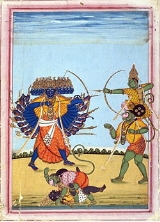vajrakrishna
I am constantly asked these questions... so I am very curious to know what explanations others may have:
Why did Rama banish Sita because a washerman doubted her faithfulness? What is the lesson for us? Why does a God behave so callously?
Why are the Puranas and Hindu mythology filled with Gods defeating Demons? What practical wisdom or significance does it have for a person's life? There is hardly a sense of ahimsa in such stories - it is dramatically misleading.
What is the lesson of Tara living with Soma (God of the Moon) and refusing to return to her husband Brihaspati (Teacher of the Gods), which leads to war? What symbolism is there in even the Gods behaving as humans do? Who is there to guide the way? How is Brihaspati meant to teach the Gods when he deals with the situation with such lust and attachment?
What is the symbolism of Brahma fornicating with his own daughter Sandhya? What is the lesson for humanity?
I am asked again and again why the Gods are not behaving with compassion and all-knowing wisdom and mostly - a lack of attachment and selfishness - in the mythological stories? Because who would want to pray to Gods who behave so selfishly and lustfully?
Why did Rama banish Sita because a washerman doubted her faithfulness? What is the lesson for us? Why does a God behave so callously?
Why are the Puranas and Hindu mythology filled with Gods defeating Demons? What practical wisdom or significance does it have for a person's life? There is hardly a sense of ahimsa in such stories - it is dramatically misleading.
What is the lesson of Tara living with Soma (God of the Moon) and refusing to return to her husband Brihaspati (Teacher of the Gods), which leads to war? What symbolism is there in even the Gods behaving as humans do? Who is there to guide the way? How is Brihaspati meant to teach the Gods when he deals with the situation with such lust and attachment?
What is the symbolism of Brahma fornicating with his own daughter Sandhya? What is the lesson for humanity?
I am asked again and again why the Gods are not behaving with compassion and all-knowing wisdom and mostly - a lack of attachment and selfishness - in the mythological stories? Because who would want to pray to Gods who behave so selfishly and lustfully?


